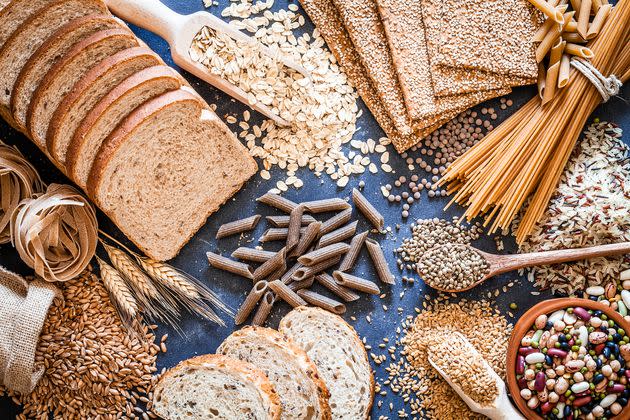A Gluten-Free Diet Isn't Healthy For Everyone. Here's Why.
You know that the gluten-free diet has reached peak cultural awareness when bottles of water — which have never contained a speck of gluten — are now carrying the “gluten-free” imprint.
Research on celiac disease (which is affected by the intake of gluten) has been conducted as far back as the 1950s, but it was considered a rare genetic disorder at that time. However, as awareness of the seriousness of food allergies grew earlier this century — remember the first time you were asked to bring nut-free donations to a bake sale? — our understanding of food-related sensitivities began to increase.
In 2010, people spent around $2.5 billion globally on gluten-free foods. Soon, books like “Grain Brain” and “Wheat Belly” were topping bestseller lists. With all that hype, many people decided that gluten — in the way that fat had before it — must be vilified, avoided and discussed. We all knew someone who was avoiding the mixture of proteins found in grains like wheat, barley and rye, or maybe we were even avoiding it ourselves.
Celiac disease is real, even if you’re sick of hearing about it.
If you’re currently experiencing a syndrome that might be called “gluten-free fatigue,” it’s completely understandable. But even though you may be tired of hearing about it, it’s important to remember that celiac disease remains a problem for many people.
“There are approximately 3 million Americans with celiac disease,” said Carla Carter, the director of outreach and programming at the National Celiac Association.
“It’s a serious genetic autoimmune disease where the body attacks the lining of the small intestine when gluten is ingested,” she said. “While the attack is on the small intestinal lining, its effects can be broad throughout the entire body.”
That’s why those with celiac disease must be so vigilant. “They need to avoid gluten down to the crumb level in order for it not to cause an autoimmune response,” Carter said.

“It’s a hereditary disease, which means that it runs in families,” said Vanessa Weisbrod, the chief education and community engagement officer for the Celiac Disease Foundation. “If you have a first-degree relative with celiac disease, like a parent, child or sibling, you have a 1 in 10 risk of developing it yourself.”
What does it feel like to have celiac disease? More than 200 symptoms have been documented, so it’s different for everyone. Molly Miller, the owner of the Sift Gluten Free bakery in Minneapolis, said, “While we focus so much on this as a digestive disease, we’ve talked to people at the bakery whose symptoms include migraines, skin issues, mental fogginess and severe all-over bloating.”
Allergies and sensitivities also cause concerns.
There’s also a less severe syndrome known as nonceliac gluten sensitivity, or NCGS. Carter estimates that more than 18 million Americans have it. Cynthia Kelly, a dietitian and the CEO of the Gluten Intolerance Group, said there’s not a clear diagnosis available.
“NCGS isn’t an allergy or an autoimmune disease,” she said. “While it’s not as likely to cause long-term health issues, it does cause symptoms. And it can have a significant impact on someone’s quality of life.”
Finally, there are people who have an allergy to wheat, one of the most common food allergies. Eating wheat can lead to hives, a rash, a stomachache or nasal issues. This can bediagnosed by an allergist, and it’s generally recommended to avoid foods and other products that trigger symptoms.
Should you eat gluten-free for health?
You’re probably still seeing lots of gluten-free products on grocery store shelves, and you might know people who avoid gluten for reasons that aren’t disease-related. Kelly cited Gluten Intolerance Group research from 2021 in which nearly a quarter of U.S. shoppers reported avoiding gluten.
With about 1 in 4 of us leaving it out of our diet, has gluten become something that we all need to avoid? The experts we talked to said no.
“The vast majority of us are genetically predisposed to manage this [gluten digestion] correctly, so much so that ... clinically we would not have any problems in eating gluten,” said Dr. Alessio Fasano, the director of the Center for Celiac Research and Treatment and the chief of pediatric gastroenterology and nutrition at Mass General for Children, in an educational video from 2020.
“Bottom line: It is not true that everybody needs to go gluten-free to stay healthy.”
Don’t go on a gluten-free diet just because you’re trying to lose weight.
Though it’s an absolute necessity for some, eating well — and cheaply — on a gluten-free diet can be challenging.
“It’s nutritionally sound for everyone to eat naturally gluten-free foods like fresh fruits, vegetables, lean proteins, dairy and gluten-free whole grains like quinoa and brown rice,” Weisbrod said.
These “whole” foods are usually a good choice. On the other hand, the experts noted that there’s no need to stock up on more expensive, less nutritious products just because they’re designated as gluten-free.
“Gluten-free packaged products tend to have lower nutritional quality than their gluten-containing counterparts,” Weisbrod said. “So if you don’t need to be gluten-free, these products are not any healthier and perhaps have a lower nutritional value.”
“Don’t assume that something labeled ‘gluten-free’ is automatically healthy for you,” Miller said. “A lot of processed gluten-free food is full of binders, starches and other fillers that can cause their own kind of digestive distress.”
“Gluten-free foods can be higher in calories, sugars and fat for a smaller serving size,” Kelly said. “If you aren’t careful, you can gain weight on a gluten-free diet.”
With food prices continuing to rise, it’s important to note that a gluten-free diet can be a costly one. “Gluten-free food is on average 183% more expensive than its gluten-containing counterparts,” Carter said.
